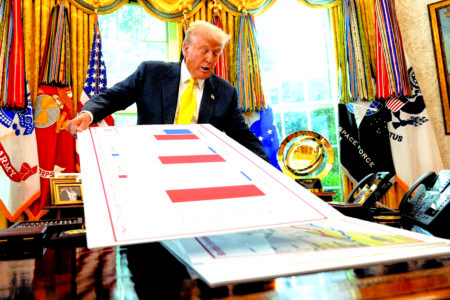President seeks changes to the national headcount
WASHINGTON (AP) — President Donald Trump has instructed the Commerce Department to change the way the U.S. Census Bureau collects data, seeking to exclude immigrants who are in the United States illegally, he said Thursday
The census’ data collections will be based on “modern day facts and figures and, importantly, using the results and information gained from the Presidential Election of 2024,” the Republican president said on his social media platform, an indication he might try to inject his politics into a head count that determines political power and how federal funding is distributed.
Trump stressed that as part of the changes people in “our Country illegally” will be excluded from census counts.
Experts said it was unclear what exactly Trump was calling for, whether it was changes to the 2030 census or a mid-decade census, and, if so, whether it would be used for a mid-decade apportionment, which is the process of divvying up congressional seats among the states based on the population count.
Any changes in the conduct of a national census, which is the biggest nonmilitary undertaking by the federal government, would require alterations to the Census Act and approval from Congress, which has oversight responsibilities, and there likely would be a fierce fight.
While the Census Act permits a mid-decade census for things like distributing federal funding, it can’t be used for apportionment or redistricting and must be done in a year ending in 5, said Terri Ann Lowenthal, a former congressional staffer who consults on census issues.
“He cannot unilaterally order a new census. The census is governed by law, not to mention the Constitution,” Lowenthal said. “Logistically, it’s a half-baked idea.”
It would be almost logistically impossible to carry out a mid-decade census in such a short period of time, New York Law School professor Jeffrey Wice said.
“This isn’t something that you can do overnight,” said Wice, a census and redistricting expert. “To get all the pieces put together, it would be such a tremendous challenge, if not impossible.”
Trump’s Truth Social post fits into an overall pattern in which he has tried to reshape basic measures of how U.S. society is faring to his liking, a process that ranges from monthly jobs figures to how congressional districts are drawn going into the 2026 midterm elections. But there could be legal challenges if he were to reshape the census, which also guides the distribution of $2.8 trillion in federal funds to the states for roads, health care and other programs.
In a 2019 decision, the Supreme Court effectively blocked Trump from adding a citizenship question to the 2020 census. The 14th Amendment says that “the whole number of persons in each state” should be counted for the numbers used for apportionment, the process of allocating congressional seats and Electoral College votes among the states based on population.
The last time the census included a question about citizenship was in 1950, and the Census Bureau’s own experts had predicted that millions of Hispanics and immigrants would go uncounted if the census asked everyone if he or she is an American citizen.
Changes to the census could also play into the efforts by Trump to urge several Republican-led states, including Texas, to redraw their congressional maps ahead of schedule in ways that would favor GOP candidates.


